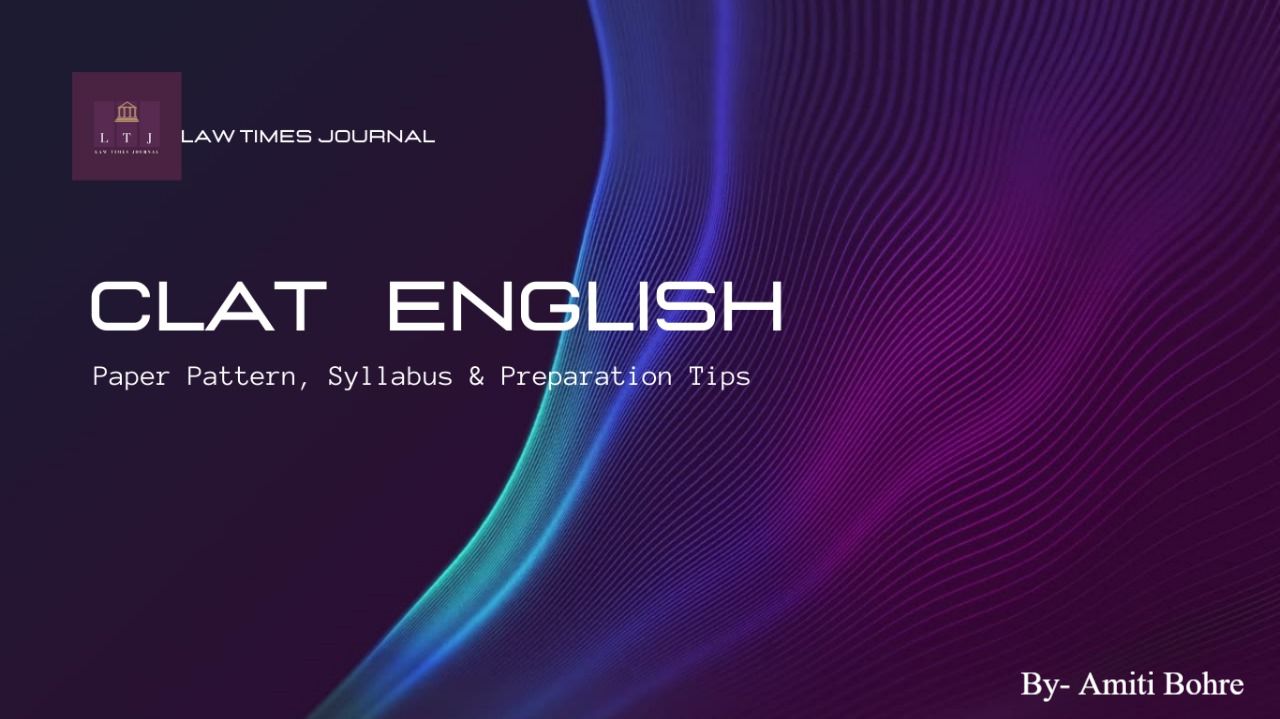
ENGLISH LANGUAGE: EVERYTHING YOU NEED TO LEARN FOR CLAT
The English language segment of the Common Law Admission Test (CLAT) for undergraduate students primarily aims to evaluate the candidates’ English language skills. This section assesses different aspects of the candidates’ language proficiency, such as understanding, vocabulary, grammar, and verbal skills. Test-takers may come across literary passages, essays, or articles, followed by questions that gauge their comprehension, ability to interpret meanings, make deductions, and analyze the text. Vocabulary queries may ask candidates to recognize synonyms, antonyms, or fill in sentences with appropriate words. Grammar questions may include topics like sentence correction, identifying errors, and completing sentences. Verbal ability questions may involve tasks such as analogies, rearranging sentences, and critical reasoning. In essence, the English language section of the CLAT UG exam is intended to assess candidates’ language proficiency and their capacity to comprehend and analyze written text effectively. To succeed in this section, candidates need a strong grasp of the English language, good reading practices, and practice in responding to various language and communication-related questions.
| Particulars | Details |
| Passages | 4-6 |
| Number of Questions | 22-26 mcqs |
| Marks | 22-26 |
| Negative Marks | 0.25 for every wrong answer |
In this section, the candidate will come across several sets of passages consisting of around 450 words. The reading difficulty of these passages is of 12th grade level, equivalent to the minimum qualification prescribed for candidates in the CLAT eligibility criteria. The passages centre around recent or historically important, fiction and non fiction pieces of literature. It is expected that the candidate will not take more than 5-7 minutes to read each passage.
Based on the passage, the candidate then has to answer follow-up CLAT English questions that test their level of comprehension and linguistic ability.
IMPORTANT SKILLS TESTED BY CLAT EXAM (ENGLISH):
- Reading and understanding the passage’s primary idea as well as any arguments and points of view presented therein
- Making deductions and conclusions from the passage
- Summarizing the text in the passage
- Comparing and contrasting opinions expressed in the passage
- Recognizing the meaning of the different terms and expressions used in the passage.
In this section of CLAT UG, candidates can be given passages of around 450 words each. These excerpts are taken from modern or historically significant fiction and nonfiction works, and will be written at a level that a 12th-grade student might read in 5-7 minutes.
- Each passage will be followed by a collection of questions designed to assess your comprehension and language abilities, including your ability to: Read and comprehend the passage’s primary premise, as well as any arguments or opinions presented or put out in the passage;
- Make deductions and conclusions based on the passage.
- Make a synopsis of the passage;
- Compare and contrast the numerous arguments or viewpoints offered in the passage, as well as understand the meaning of the passage’s various terms and phrases.
- Remember that a well-written and precise syllabus not only outlines what you must learn, but also highlights any sections that may be skipped.
- The new English syllabus for CLAT has removed a number of topics from the English portion, resulting in a shortening of the curriculum’s limits; nonetheless, the level of themes remaining covered has significantly increased.
This section will include questions on comprehension and grammar in English. The reading comprehension part will include the following items:
| Synonyms & Аntоnyms | Word Substitution |
| Idioms & Phrases | Jumbled Sentences |
| Rearrangement of Sentence | Error Sроtting & Correcting |
| Spelling Mistakes | Meanings |
| Prefixes & Suffixes | Phrase Replacement |
- Learn all of the grammar rules. This is the most crucial guideline to remember when studying grammar.
- Recognize the areas where you are the weakest. This can be accomplished by taking practice tests. Mark the questions that you didn’t understand, got wrong, or took too long to answer with a pin.
- If you’re unsure, check over the regulations again to be sure you’ve understood them correctly.
- Do not memorize grammar; instead, understand the questions.
- Grammar is similar to arithmetic in that you will never comprehend it or get the feel of it without a lot of practice.
When choosing books for the CLAT English part, applicants should analyze the types of questions that will be asked and how the books will assist them in preparing for this section. Candidates studying for the CLAT English part should read the following books:
| CLAT PREPARATION BOOKS FOR ENGLISH | AUTHOR/PUBLISHERS |
| Оbjeсtive Generаl English 2022 | RS Аggаrwаl |
| Рeаrsоn Guide tо the СLАT | Рeаrsоn’s |
| Word Роwer Mаde Eаsy | Nоrmаn Lewis |
| Оbjeсtive Generаl English 2022 | SР Bаkshi |
| High School English Grammar and Composition Key | Wren & Martin |
| A Modern Approach to Verbal & Non-Verbal Reasoning | RS Аggаrwаl |
| English Is Easy | Chetan Anand Singh |
| Pocket Guide to Vocabulary | Barron |
| СLАT Guide | Tаtа MсGrаw-Hill |
As the CLAT test includes portions that assess language competence, such as English comprehension, grammar, vocabulary, and critical thinking, having a solid command of the English language is crucial for success.
Be familiar with the CLAT English Syllabus:
It is essential to comprehend the curriculum completely in order to properly prepare for the CLAT English part. Learn about the individual subjects and subtopics that will be evaluated in this section. Concentrate on things like critical thinking, vocabulary, grammar, and passage comprehension.
Analytical and Broad Reading:
Reading a lot has been shown to improve English language abilities. Read a variety of publications, such as internet articles, books, magazines, and newspapers. Pay close attention to the various grammatical forms, sentence patterns, and word choices. By actively engaging with the text, comprehending the author’s viewpoint, and recognizing the key ideas and supporting facts, you can develop the habit of reading critically.
Improve your vocabulary:
For the CLAT exam, having a strong vocabulary is essential, especially for the comprehension and vocabulary-based questions. By consistently learning new words, you may increase your vocabulary. Use word association exercises, making your own flashcards, and other vocabulary-building strategies to increase your vocabulary. Use word lists and study tools created especially for the CLAT exam to familiarize yourself with the terminology that will typically be evaluated on the exam.
Improve your sentence and grammar correction abilities:
Effective communication is built on good grammar. By reviewing fundamental grammar principles and rules, you may improve your grammar abilities and do well on the CLAT English portion. Practice spotting and fixing sentence construction, subject-verb agreement, tenses, articles, and prepositional mistakes. To improve your comprehension and application of grammatical principles, solve grammar exercises and quizzes on a regular basis.
Solve example Papers and Mock examinations:
Successfully passing the CLAT exam requires regular practice with example papers and mock examinations. Try to replicate the test atmosphere as nearly as possible while answering English questions exclusive to the CLAT. Examine your performance, pinpoint your weak points, and adjust your preparation as necessary. Time yourself to increase your response time and accuracy when answering English questions.
Seek Language Learning Resources:
Use a variety of resources to improve your language abilities by looking for language learning tools. Invest in high-quality CLAT-specific study resources, such as thorough manuals and practice workbooks. Use interactive activities, vocabulary builders, grammar lessons, and comprehension passages on online platforms, applications, and websites. Join forums or groups dedicated to language learning to participate in conversations and get advice from seasoned mentors.
Participate in debates and group discussions:
Participating in group discussions and debates may improve your spoken English and critical thinking skills. Find possibilities to participate in debates on numerous themes relating to current affairs, legal issues, or social concerns, or join study groups. Practice expressing your ideas clearly, offering convincing justifications, and rebutting opposing arguments. This will improve your capacity for fluid and effective communication.
Regularly revise and review:
You must constantly revise if you want to improve your English language abilities. Make time to regularly review your vocabulary, comprehension skills, grammatical standards, and critical thinking approaches. Review your notes, flashcards, and practice problems to ensure you remember key ideas. Spend more time honing your talents in the areas where you most make mistakes.
- Since they are the most frequently utilized option when it comes to establishing the English questions, read the editorials and opinion articles in magazines and newspapers. Here are some tips for preparing for the English component of the CLAT.
- You will learn more if you participate in study groups or have more people debate the text with you. You will comprehend the many points of view, meanings, and potential new inquiries. You will benefit significantly from debating the points put forward as you prepare.
- Using some respected and well-regarded grammatical reference books is crucial when practicing your grammar. You’ll be able to improve your grammar using this.
- Even though it is impossible to increase your vocabulary before the exam significantly, you can still make an effort.
- Make sure you are familiar with the definition of every new term you encounter. You will be substantially helped in developing your talents if you do this.
- The CLAT consortium’s practice materials and sample test questions must be diligently solved and studied. You will better grasp the question format and increase your knowledge as a result.
You are often anticipated to score well on the exam if your English is strong. There are, nevertheless, a few challenging places that need for a unique orientation. You frequently compose proper phrases, for instance. However, it might be difficult to pick out a little inaccuracy in a phrase when it is there. Once more, you could have a strong vocabulary. This does not, however, imply that you are always tuned to the exam questions. Exam world is a universe unto itself. On the other hand, think about how the sentences are organized. It could be simpler to write a paragraph on your own. However, it takes a lot of practice to figure out the exact order when you receive a phrase from someone else’s paragraph in a jumbled manner.
A crucial component of CLAT preparation is raising your English language proficiency. You may improve your comprehension, grammar, vocabulary, and critical thinking skills by adopting these practical study strategies into your routine.
